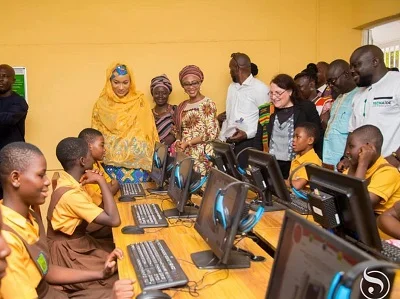Digital divide widens: Only 2% deprived basic schools have functional ICT labs – Eduwatch report
By Ernest Bako WUBONTO
A new report by Africa Education Watch (Eduwatch) has revealed a severe lack of information communication technology (ICT) infrastructure in Ghana’s deprived basic schools, with only two percent having access to functioning facilities despite Computing being part of the national curriculum.
The report indicated that aside from making digital skills a core competency in the basic education curriculum, there is no deliberate policy to provide basic schools with ICT facilities, including the Internet.
The ICT Facilities and Computing sub-section of the ‘Education Sector Medium-Term Development Plan (2022-2025) Review’ report, which assessed schools in both deprived and endowed districts, found that out of 1,033 basic schools in marginalised communities, merely 21 – representing two percent – have operational ICT labs.
Perhaps under the principle of ‘if life gives you lemons, you make lemonade out of it’, 49 percent – representing 510 of these deprived schools – still attempt to teach Computing without proper tools.
Interestingly, out of the 769 endowed schools, only 60 – representing eight percent – have an ICT laboratory. With 401, which is 52 percent, teaching Computing in their curriculum.
Electricity gap
The report highlights a critical barrier related to electricity access. While 77 percent of endowed schools have power, just 37 percent in deprived areas do far below the national average.
ICT laboratory or infrastructure runs currently with electricity for functionality and efficiency. The report also identified that deficit in access to electricity is almost twice higher than national average in deprived areas.
“Without electricity, there cannot be any effective teaching of Computing leading to digital skills or STEM education,” stated the report.
Executive Director of Eduwatch, Kofi Asare, emphasised that the adaptation of infrastructure to enhance ICT education must be comprehensive, comprising Internet connectivity, electricity, furniture and school buildings to achieve meaningful results.
Ghana Education Strategic Plan (ESP)
ICT education is one of the core themes under Ghana’s Education Strategic Plan (ESP), which outlines the country’s vision and roadmap for achieving quality education for all.
The Education Sector Medium-Term Development Plan (ESMTDP) 2022-2025 is a critical component of this strategy, designed to align with Ghana’s commitment to Sustainable Development Goal four (SDG 4), which aims to ensure inclusive and equitable quality education and promote life-long learning opportunities for all.
As Ghana navigates the final year of the ESMTDP (2022-2025), it is crucial to review the performance of various indicators against set targets to inform the development of the next phase of the Plan (ESMTDP 2026-2030).
Eduwatch has recommended the adaptation of a targeted policy and budgeting system to bridge the deprived-endowed divide in basic education ICT facility.
The education think tank further urged the Ghana Education Service (GES) to adopt an inclusive policy and financial reporting framework that captures indicator performance in deprived districts.
Districts covered included Nkwanta South, Zabzugu, Tatale Sanguli, Tain, Bongo, Nabdam, Ejura Sekyedumase, Obuasi East, Ejisu, Adenta, Ga East, Ledzokuku, Ga West and La-Nkwantanang Madina, which span 6 regions – Ashanti, Bono, Greater Accra, Oti, Northern and Upper East.
ICT education relevance
ICT education at the basic level is crucial in today’s digital world to equip young learners with essential skills that will prepare them for future academic, professional and personal success.
Research has shown that early exposure to ICT helps children become comfortable with technology, fostering skills they will need throughout their lives; hence, the relevance of good foundation for digital literacy at an early age.
Learning to use digital tools allows students to explore creative ideas, whether through coding, Nsemkeka design or digital storytelling, promoting creativity and innovation.
The post Digital divide widens: Only 2% deprived basic schools have functional ICT labs – Eduwatch report appeared first on The Business & Financial Times.

